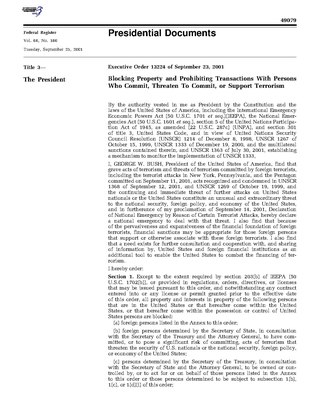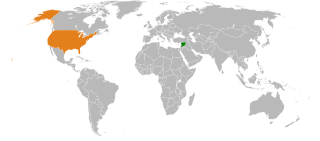
"State Sponsors of Terrorism" is a designation applied to countries that are alleged to have "repeatedly provided support for acts of international terrorism" per the United States Department of State. Inclusion on the list enables the United States government to impose four main types of unilateral sanctions: a restriction of foreign aid, a ban on weapons sales, heightened control over the export of dual-use equipment, and other miscellaneous economic sanctions. The State Department is required to maintain the list under section 1754(c) of the National Defense Authorization Act for Fiscal Year 2019, section 40 of the Arms Export Control Act, and section 620A of the Foreign Assistance Act.
The National Security Strategy (NSS) is a document prepared periodically by the executive branch of the United States that lists the national security concerns and how the administration plans to deal with them. The legal foundation for the document is spelled out in the Goldwater–Nichols Act. The document is purposely general in content, and its implementation relies on elaborating guidance provided in supporting documents such as the National Military Strategy.

The Office of Foreign Assets Control (OFAC) is a financial intelligence and enforcement agency of the United States Treasury Department. It administers and enforces economic and trade sanctions in support of U.S. national security and foreign policy objectives. Under presidential national emergency powers, OFAC carries out its activities against foreign governments, organizations, and individuals deemed a threat to U.S. national security.
Foreign Terrorist Organization (FTO) is a designation for non-United States-based organizations deemed by the United States secretary of state, in accordance with section 219 of the Immigration and Nationality Act of 1965 (INA), to be involved in what US authorities define as terrorist activities. Most of the organizations on the list are Islamist extremist groups; the rest are nationalist/separatist groups, or Marxist militant groups.
The main event by far shaping the United States foreign policy during the presidency of George W. Bush (2001–2009) was the 9/11 terrorist attacks against the United States on September 11, 2001, and the subsequent war on terror. There was massive domestic and international support for destroying the attackers. With UN approval, US and NATO forces quickly invaded the attackers' base in Afghanistan and drove them out and the Taliban government that harbored them. It was the start of a 20-year quagmire that finally ended in failure with the withdrawal of United States troops from Afghanistan.

Executive Order 13224 is an executive order issued by U.S. President George W. Bush on September 23, 2001, as a response to the attacks on September 11, 2001. It has been renewed every year since.

The International Emergency Economic Powers Act (IEEPA), Title II of Pub. L. 95–223, 91 Stat. 1626, enacted October 28, 1977, is a United States federal law authorizing the president to regulate international commerce after declaring a national emergency in response to any unusual and extraordinary threat to the United States which has its source in whole or substantial part outside the United States. The act was signed by President Jimmy Carter on December 28, 1977.

The Office of Intelligence and Analysis (OIA) is an agency of the United States Department of the Treasury responsible for the receipt, analysis, collation, and dissemination of foreign intelligence and counterintelligence information related to the operation and responsibilities of the Treasury Department.

Although relations began in 1835, diplomatic relations between Syria and the United States are currently non-existent; they were suspended in 2012 after the onset of the Syrian Civil War. Priority issues between the two states include the Arab–Israeli conflict, the Golan Heights annexation, alleged state-sponsorship of terrorism, etc. As of 2025, the United States had begun to work with the new Syrian government after the collapse of the former regime under the Assad family.
A Specially Designated Global Terrorist (SDGT) is a person or entity that has been designated as such by the United States Department of State or the U.S. Department of the Treasury. An SDGT designation is made under authority of U.S. Executive Order 13224 of September 23, 2001, as amended by Executive Order 13268 of July 2, 2002, and Executive Order 13284 of January 23, 2003, and Title 31, Parts 595, 596, and 597 of the U.S. Code of Federal Regulations, among other U.S. laws and regulations. The main regulatory framework underlying the SDGT designation was established two weeks after the September 11 attacks in 2001 by U.S. President George W. Bush.

The Army of the Men of the Naqshbandi Order, also known as the Naqshbandi Army, is one of a number of underground Ba'athist militant insurgency groups fighting U.S.-led Coalition forces in Iraq. Media frequently refers to the group by the initials JRTN, a romanization of its Arabic name. Supreme Command for Jihad and Liberation, technically the name of the umbrella organization to which JRTN belongs, is also often used to refer to JRTN specifically.
The following is a timeline of the presidency of Barack Obama, from January 1 to December 31, 2015. For his time as president-elect, see the presidential transition of Barack Obama; for a detailed account of his first months in office, see first 100 days of Barack Obama's presidency; for a complete itinerary of his travels, see list of presidential trips made by Barack Obama.

International sanctions against Afghanistan were implemented by the United Nations in November 1999. The sanctions were initially aimed at terrorists, Osama bin Laden and members of Al-Qaeda. The United States, the United Kingdom and the European Union also impose sanctions on Afghanistan.

The Ministry of Internal Security in Somalia plays a crucial role in maintaining national stability and public safety by overseeing law enforcement agencies, including the Somali Police Force, National Intelligence & Security Agency(NISA), Immigration & Citizenship Agency and others ,The ministry formulates security policies to address internal threats. The ministry manages intelligence operations, coordinates emergency responses, and enhances security personnel's effectiveness. Additionally, it oversees immigration and border security, regulating entry and exit to support national security objectives.

Akram Abbas al-Ka'abi is an Iraqi militant leader who is the founder and Secretary-General of Harakat Hezbollah al-Nujaba (HHN) in Iraq. Kaabi is a U.S.-designated terrorist who is regarded as one of the main operatives of IRGC's Quds Force in Iraq. He has been an ardent supporter and promoter of Iranian influence in Iraq while being the most outspoken critic of American military presence as he seeks to compel U.S. forces to withdraw completely from Iraq.








